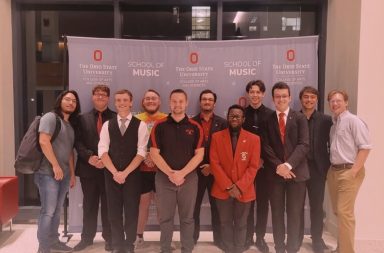
Parents of Chase Meola, a fifth-year in marketing who was shot and killed in October 2020, are suing Phi Kappa Si in U.S. District Court. Credit: Courtesy of Ris Twigg
The family of an Ohio State student who was shot and killed outside a fraternity house party in October 2020 filed two separate lawsuits this week against the Phi Kappa Psi Fraternity and Ohio State, arguing they failed to take action to keep students safe.
Chase Meola, a fifth-year in marketing from Mahwah, New Jersey, and a former member of Ohio State’s Delta Phi Psi chapter, was shot outside the fraternity house on East 14th Avenue Oct. 11, 2020, allegedly by Kintie Mitchell Jr. after Mitchell and other “uninvited individuals” were asked to leave the party. Chase Meola was 23-years-old at the time.
According to the lawsuit against the fraternity from the U.S. District Court filed by Chase Meola’s parents Margaret and Paul Meola, the fraternity’s national chapter’s negligence to supervise its local chapters “created the dangerous conditions” that led to Chase Meola’s death. The federal lawsuit claimed despite its suspension from the university, Ohio State’s former Delta chapter continued to “hold itself out as an active fraternity, held parties and served alcohol and otherwise engaged in fraternity activities on and before Oct. 11.”
Ohio State’s Delta chapter of Phi Psi was suspended in March 2018 until August 2022 for “violations including hazing, endangering behavior, and alcohol.” The chapter was suspended at the time of Chase Meola’s death.
Ronald K. Ransom II, executive director of Phi Kappa Psi, said in an email the fraternity is aware of the lawsuit and keeps “Chase’s family, friends and the entire Ohio State University community in our thoughts and prayers.” However, the fraternity declined to comment on the pending litigation.
Chase Meola’s parents did not respond to requests for comment by the time of publication.
Chase Meola’s parents are seeking $75,000 in damages for wrongful death and negligence, according to the federal lawsuit. The lawsuit claims the defendants had “inadequate safeguards against high levels of crime” for the fraternity house and had a duty to warn and educate students, like Chase Meola, on crime in the University District.
“Defendants knew or should have known of the increased risks and level of crime in general, and violent crime in particular, in and around the area of the Ohio Delta Phi Psi Fraternity,” the lawsuit stated.
Because the federal lawsuit was filed with the U.S. District Court, Phi Kappa Psi’s national and former-Ohio State’s Delta chapter are required to respond to the lawsuit within 21 days of notification.
The lawsuit against the university was filed with the Ohio Court of Claims.
According to the lawsuit in the Court of Claims, the university “failed to reasonably control or otherwise stop the partying, alcohol consumption, and the presence of Greek life” in the University District. The lawsuit also stated the university knew the suspended Phi Psi chapter was operating underground “like a speakeasy right next to campus.”
Margaret and Paul Meola are seeking $25,000 for burial costs and compensatory damages, according to the lawsuit against Ohio State. The lawsuit claimed the university “acted negligently” by failing to warn its students of dangers within the University District.
The lawsuit against Ohio State argues at the time of Chase Meola’s death the university did not have security patrols, security cameras or mobile lighting in the off-campus area. The university introduced new safety measures in off-campus neighborhoods Sept. 1, 2021, according to leaders of both the Columbus Division of Police and University Police Division.
University spokesperson Chris Booker said in an email the university is reviewing Meolas’ legal filing against the university. He said when Phi Psi had its on-campus fraternity status revoked in March 2018, it no longer had the privileges to be a recognized organization.
“Students remain subject to the Code of Student Conduct and additional violations may lead to individual disciplinary action, extensions to the organizational revocation and/or referrals to law enforcement in alignment with Collin’s Law,” Booker said.
Mitchell — who is not affiliated with Ohio State — was arrested and indicted on Oct. 21, 2020, and pled not guilty for Chase Meola’s murder. Mitchell’s trial has been consistently delayed for two years and is set for December.
After Chase Meola’s death in 2020, over 300 people attended a candlelight vigil in his honor, and he was posthumously awarded a Bachelor of Business Administration by the university at the spring 2021 commencement ceremony. Fisher College of Business placed a memorial for Chase Meola in its quad.
This story was updated at 5 p.m. to include the lawsuit against Ohio State and again at 6:12 p.m. to include comment from Phi Kappa Psi’s national chapter.


